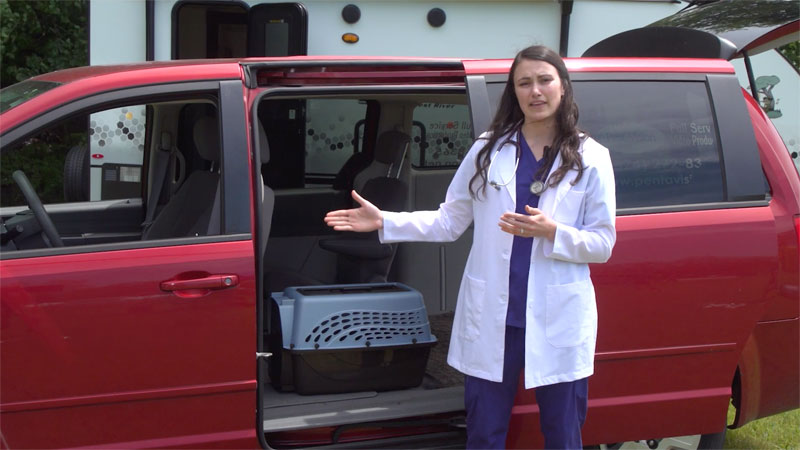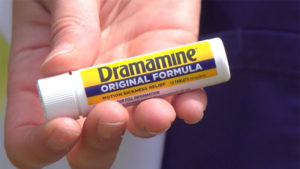rving with pets
Pets and Car Sickness with Dr. Fitz on 'Paws on Board'
I’m Dr. Fitz. This is Ziggy and her pet parent Hannah. Today we’re going to be discussing car sickness in dogs and what you can do about it. As many of you are preparing your RVs and trailers for the road, you might also be planning to take your canine friends along for the ride. As a veterinarian, a common complaint that I get from my clients is that during longer road trips, say to visit relatives or going on vacation, their dog throws up in the car, and that’s not a mess that anyone wants to clean up. Yes, dogs can and do get carsick. Although it can be frustrating for both the dog and the owner, there are treatment options available for car sickness.
 First, planning out how your pet will travel in the car or RV can be helpful in limiting the severity of the car sickness. Make sure if your pet is traveling in a crate or carrier that it’s oriented front to back in the vehicle. From personal experience with my own cat, having her oriented front to back in the car severely reduced her car sickness and she rarely threw up. Anytime I orient her side to side it usually ends very badly.
First, planning out how your pet will travel in the car or RV can be helpful in limiting the severity of the car sickness. Make sure if your pet is traveling in a crate or carrier that it’s oriented front to back in the vehicle. From personal experience with my own cat, having her oriented front to back in the car severely reduced her car sickness and she rarely threw up. Anytime I orient her side to side it usually ends very badly.
There are medical treatment options for car sickness just like with people. Not every treatment is good for every pet and not every treatment works for every pet. Some pets might be sensitive or unable to take specific medications. So as with any medical treatment, always contact your primary care veterinarian for which treatment option and dose is correct for your pet. Common treatments for car sickness include first Benadryl. Benadryl is an antihistamine. It’s not specifically meant for carsickness. However, we sometimes take advantage of the drowsiness that occurs to make our pets more comfortable for the ride. But don’t be discouraged if Benadryl doesn’t work for your dog. Next, there’s diamond hydrogenate or Dramamine. This is a very common motion sickness medication used in people. However, be careful. The dose is different for dogs than it is for people. Again, this doesn’t always work for every pet, but I have had some owners have good success with this medication.
 Next, there’s Meclizine or the non drowsy version of Dramamine. This can make some pets sleepy, unlike in people. So just be aware of that. This is another alternative to Dramamine and it can help with motion sickness, but as I said, with every medication, it might not work for every pet. Finally, there’s a medication called Maropitant or Cerenia. This is a veterinary grade anti-nausea medication. This is often what we use in the clinic to treat pets that are vomiting due to GI upset. However, it can be used for motion sickness at a higher dose. Just be aware that this medication is a bit more expensive than our antihistamines, but it tends to work very, very well. So this is definitely an option if your pet gets carsick. So as always, talk to your veterinarian about which of these medications would work best for your pet. For more information about traveling safely with your pets, visit rollinontv.com. Tune in next time for more pet health information. I’m Dr. Fitz. This is Hannah and Ziggy. Thanks for watching “Paws on Board.”
Next, there’s Meclizine or the non drowsy version of Dramamine. This can make some pets sleepy, unlike in people. So just be aware of that. This is another alternative to Dramamine and it can help with motion sickness, but as I said, with every medication, it might not work for every pet. Finally, there’s a medication called Maropitant or Cerenia. This is a veterinary grade anti-nausea medication. This is often what we use in the clinic to treat pets that are vomiting due to GI upset. However, it can be used for motion sickness at a higher dose. Just be aware that this medication is a bit more expensive than our antihistamines, but it tends to work very, very well. So this is definitely an option if your pet gets carsick. So as always, talk to your veterinarian about which of these medications would work best for your pet. For more information about traveling safely with your pets, visit rollinontv.com. Tune in next time for more pet health information. I’m Dr. Fitz. This is Hannah and Ziggy. Thanks for watching “Paws on Board.”


